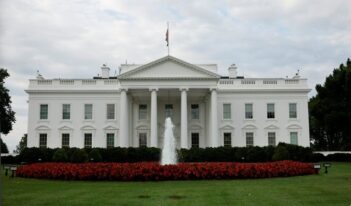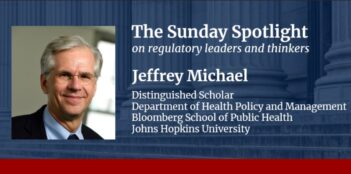
Scholar urges states to restrict generous vaccine exemptions in the wake of measles comeback.
In 1950s America, approximately 3.5 million children contracted measles each year, resulting in 48,000 hospitalizations, 4,000 cases of acute brain inflammation and 500 deaths on average, according to the Centers for Disease Control and Prevention (CDC). But after the introduction of the measles vaccine and the passage of the Vaccination Assistance Act in 1963—providing federal support to state and local mass immunization campaigns for the first time in history—measles incidence shrank dramatically. With over 90% of children receiving the MMR vaccine in the 1990s, the CDC victoriously declared in 2000 that measles had been eliminated.
Flash-forward to 2014, when the U.S. suffered a record-breaking, multi-state measles outbreak: 668 cases in 27 states. What prompted the return of a disease that had virtually vanished more than a decade ago?
In a recent article, Georgetown University’s Lawrence Gostin argues that overbroad exemptions to state vaccination requirements are to blame. Every state requires children older than five years of age enrolled in state-licensed day care centers, public schools and—in most states—private schools to receive certain vaccinations. Although a team of 15 medical and public health experts called the Advisory Committee on Vaccination Practices (ACIP) develops federal recommendations for routine administration of vaccines, only states have the power to mandate them, Gostin explains.
Yet, state immunization laws and regulations are also riddled with exemptions, says Gostin. All states grant physician-certified medical exemptions for children who have immune deficiencies, allergic reactions and other contraindications. Additionally, all but West Virginia and Mississippi presently allow exemptions on the basis of religious belief, and 20 states permit exemptions due to “personal,” “moral,” or “other” beliefs.
There is nothing inherently wrong with vaccination exemptions, says Gostin. The problem, he contends, lies in states’ grossly varying requirements for obtaining non-medical exemptions. To receive a philosophical exemption in Arkansas, for example, parents must submit a notarized request, undergo immunization counseling, and secure the health department’s approval. In contrast, Vermont’s Immunization Regulations require only a parent’s signature on a preprinted form.
Although vaccine-exempt children constitute a small percentage of the school-age population, concedes Gostin, the number of exemptions has been increasing. As a consequence, vaccination rates are plummeting and vaccine-preventable diseases are on the rise, says Gostin. He points to a 2012 study by Emory University researchers demonstrating that exemption rates are 2.3 times lower in states with more rigorous exemption processes. Moreover, a 2006 study by Johns Hopkins University and CDC researchers revealed that states that easily grant non-medical exemptions have 50% higher pertussis rates, he emphasizes.
Gostin attributes these trends to the erosion of “herd immunity.” In other words, when most individuals in the community are immunized against a contagious disease, the probability that non-immune individuals will come into contact with an infectious individual is small. Thus, even with few free riders, everyone is protected. But if large numbers of people invoking religious or philosophical beliefs in one community exempt themselves from vaccination, the cycle of herd immunity is broken, allowing a contagious disease to infiltrate the population. A safe neighborhood becomes a tragedy of the commons, says Gostin.
Courts have long held compulsory vaccination programs to be well within states’ police powers due to the overriding public health interest at stake. For example, the Supreme Court upheld a smallpox mandate in 1905 and ruled that vaccinations required for school entry do not violate constitutional rights in 1922. But while medical exemptions are constitutionally required, waivers on religious and philosophical grounds are not, says Gostin. As such, allowing non-medical exemptions is—above all else—a political choice, he argues.
According to Gostin, parents opposing mandatory vaccinations and seeking exemptions on philosophical and religious grounds cite a variety of concerns, particularly health risks. Even as the measles outbreak was underway, for instance, Senator Rand Paul, who believes vaccines should remain voluntary, claimed to have “heard of many tragic cases of walking, talking, normal children who wound up with profound mental disorders after vaccines.” Yet, as Gostin points out, the paper that launched the modern anti-vaccine movement—disbarred surgeon Andrew Wakefield’s 1998 study falsely linking the MMR vaccine to autism—has been retracted. Vaccines are certainly not risk-free, says Gostin, but the risks are generally mild, extremely rare, and well worth accepting to live in a society where outbreaks of potentially deadly diseases are uncommon.
Gostin counsels states against adopting draconian solutions such as fining and imprisoning parents or resorting to tort litigation, arguing that these measures would create a backlash to vaccine policy. Although some states might opt to eliminate non-medical exemptions altogether, the better solution, Gostin says, is develop rigorous procedures for claiming non-medical exemptions. In the words of legal scholar Cass Sunstein, a “nudge” in the form of better education and tougher exemptions may be all that is required to raise vaccination rates, Gostin says.
The recent measles outbreak rekindled a historic, impassioned debate about balancing public health and private choice. But when an individual’s rights put the lives of the larger community at risk, there is no debate, Gostin says. By ensuring that immunization exemptions are granted in rare, necessary circumstances, Gostin concludes, states can prevent another measles outbreak and protect the lives of children. And that is something he believes everyone can get behind.



